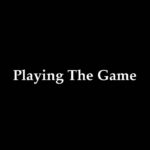 Galatians 5:1 – It was for freedom that Christ set us free; therefore keep standing firm and do not be subject again to a yoke of slavery.
Galatians 5:1 – It was for freedom that Christ set us free; therefore keep standing firm and do not be subject again to a yoke of slavery.
Imagine that you woke up in a world where magic was normal. As you went about your day you quickly realized that people were using magic as though it was natural. People were making objects move without touching them. People were making things appear and disappear, seemingly without any surprise or any special attention to the goings-on. You start wondering how they are doing what they are doing and wondering if maybe you also can do magic. You finally stop someone and ask them how they are doing magic? The person you speak to stares at you confused and asks, “What do you mean?”
You answer, “The magic, what is it that you do to make it work?”
She answers, “Do? I don’t “do” anything, it just happens when I need it to do what I need to be done.”
You stare for a moment and say, “Yes, but,” (as though you somehow understood what she just said), “what I am asking is what do you do, personally, yourself, to make it happen?”
She stares at you again for a moment, “Oh, I get it. It does not work for you, and you think there is something that you must do to get it to work, right?”
You give her a wan smile, and say, “Uh … yea. I see all of you doing magic, and I can’t, so I think that there must be something I need to do to make it happen.”
“That’s where you are getting it wrong,” she says “Magic just is, it happens as you need it. There is nothing you can do to make it happen. You just live according to the rule, and it works”
You brighten up a bit at this statement, and ask, “What rule?”
She replies, “Believe that it works, and it will.”
You feel disappointed in her reply, and say, “Sure, you can say that because it already works for you.”
“That’s your problem, you see.” she smiles and continues, “It doesn’t work for me, it works for everyone.”
BIBLICAL PRINCIPLES
Let me make one point clearly and quickly, magic is not part of the Christian walk in any manner at all. I used the above story as an example of how someone may think they understand something that is real, and then finds they cannot benefit from that thing because they do not know how to use it. Biblical principles are the real thing which many Christians believe exist, but they do not benefit from them because they do not use them as they are supposed to be used. As with the example above regarding magic, many believers have learned that the Bible teaches certain real and valuable principles which God intends for the use and benefit of His children. These principles provide the one who applies them the ability to deal with a natural situation or circumstance and introduce the power of God into the mix. Another way of saying this is to say that you can deal with issues and problems in your life in the way you believe to be right (which means you are responsible for the outcome and consequences), or you can handle things according to God’s will (via the principles taught in the Scriptures), and God then assumes the responsibility for the outcome and consequences. This may sound a lot like cheating, but this is an option which God provides for His children and anyone else who applies these principles to their lives. Biblical principles are the keys to seeing God’s power for real.
What Christian would not want to see the power real and active in their personal life? Even those humans who have not yet come to accept Christ as their Savior are looking for something to help them deal with their life. People, in general, want to believe that God is real and that He can do what Christians claim He can, but too often when they look into the life of a Christian they see the opposite. Too often they see Christians who behave as though they never truly came to know Jesus, or make life decisions which clearly violate the Scriptures, or who treat others with little to no compassion or mercy. Too often, people who call themselves Christian live in circumstances and situations which the Bible teaches that a believer should be able to change and improve. Remember that the Bible teaches something which all Christians should understand and, therefore, live accordingly, in Ephesians 3:20 (NASB), it says, “Now to Him who is able to do far more abundantly beyond all that we ask or think, according to the power that works within us.” Notice the last six words of that verse, “the power that works in us.” This is one of those principles which were given to us for our benefit. The “power of God” which is necessary to affect our lives is already in all those who have come to believe in Christ. It is not something we have to do something to get, nor is this “power” something that we have to do anything to get it to work. It is already in us, and it is already powerful. The earlier part of the verse gives us the hint on how to live according to the principle, God can do “abundantly beyond” what we can think or imagine. God is encouraging you and me to believe Him for greater things.
The problem with being human is that we tend to judge ourselves harshly. We remind ourselves of the fact that we are not perfect over and over. Even when others give us praise for achievements which we actually accomplished, too many persons will listen more to that harsh voice in their heads telling them that they are just being proud and that pride is somehow wrong. Therefore, we tend to either reject or ignore that feeling within us that wants to exceed the norm. Once when Jesus was speaking with His disciples, He told them that “all things are possible to those who believe.” He gave them the key to the principle regarding the “power that works within us.” God is not hanging these “powers” over your head like some carrot is used to get donkeys to move. He really does want you to use these principles to make your life better. But, and there is always a “but.” Like the example in the story on magic above, you have to follow the “rule.” And, you are probably asking, “What is the “rule?”
THE RULE OF FREEDOM
Now I will get back to the verse I used at the beginning of this chapter. Galatians 5:1, “It was for freedom that Christ set us free; therefore keep standing firm and do not be subject again to a yoke of slavery.” What’s the “rule?” Stand firm and do not be subject again to a yoke of slavery.
I know, you are going, “Huh?” Let me explain. The verse begins with “It was for freedom that Christ set us free.” We are going to have to learn what the Lord intends for us to understand by way of these nine words. The first thing you will hear from people is that this freedom means we were free from “sin.” Here are the most used verses to support this truth.
Romans 8:2 (NASB) “For the law of the Spirit of life in Christ Jesus has set you free from the law of sin and of death.”
1 Timothy 5:22 (NASB) “Do not lay hands upon anyone too hastily and thereby share responsibility for the sins of others; keep yourself free from sin.”
Romans 6:18 (KJV) “Being then made free from sin, ye became the servants of righteousness.”
Romans 6:22 (KJV) “But now being made free from sin, and become servants to God, ye have your fruit unto holiness, and the end everlasting life.”
Romans 8:2 (KJV) “For the law of the Spirit of life in Christ Jesus hath made me free from the law of sin and death.”
As someone who always wants to interpret the Scriptures as closely as possible in the manner our Lord wants, I have to admit that these verses clearly state that those people, who have accepted Christ as their Savior, have been freed from “sin.” This clearly means that they are no longer under the power of “Sin” to manipulate them into sinning. These dear believers now have the ability to reject the power of sin in their lives. Of course, what it does not mean is that these dear people will never sin again in their lives. They have been given this “power” of freedom to exercise in their lives as they so choose. The truth, along with the fact that they have the ability to reject “sin’s” power over them, is that they are also free to allow “sin” to enter their lives as well. Of course, the Lord desires they do not allow sin to affect them anymore, but they have the freedom to choose as they will. This last point is where I am heading with my arguments.
STAND FIRM
The first part of the “rule” of freedom is that the person needs to learn the truth about this God-given freedom, and what it means for her personal life. We are told to “stand firm.” The idea is that you reach a clear conclusion on what this freedom is and means, and then you do not let anything distract or dissuade you from that truth. So, the question here is, “What did Paul mean by “It was for freedom?”
Freedom, according to the dictionary, is defined as meaning, “The power or right to act, speak, or think as one wants without hindrance or restraint.” This is a key and crucial understanding which must be included in any and all interpretations regarding freedom as taught in the Scriptures. Freedom is not freedom unless someone is able to choose to do anything they want, and that what they want to do is also permitted. By “permitted,” I am not saying we have to agree with what someone does, but that they have the legal option to act or decide in the manner they choose. If God stops someone from doing something, then they do not have freedom in that area or option. There is one point I feel I have to make, and that is that God has specific plans which must happen in the manner He has decided. These particular plans involve the progress of His objectives and goals of human life, individual believers, and the future ages. These plans cannot be allowed to be disturbed or in any way interfered with. In the progress of these plans, God does not give anyone the unlimited freedom to do as they wish. We do not have the freedom to change any part of the plans of His, because that could cause unknown results. Then, we could not depend on His Word because someone could possibly change it. The truth is that we will never be able to change or interfere with God’s plans, nor should we have the freedom to so do.
On the other hand, as per the dictionary definition, true freedom includes the ability to choose to do what we think is right, wrong, to disobey God, or to choose to do what God wants from us. This has to include everything and anything, and God has to permit this, or it cannot be called freedom. Let’s look at this a little closer. If it was for “true” freedom that Jesus set me free, then I should be able to choose to live, act, and decide in any manner I so choose, and God has to allow me the privilege of making the choice. He may prefer that I choose differently, but He must agree that I can choose in any manner I want. As long as this is true, I will have true freedom. The main point is that unless someone has true freedom, then if they choose Jesus, they are not freely and willingly making the choice. A person has to have the option to choose against God, yes, even to believe that what they choose instead of Him is better for their lives, otherwise, they do not truly have a real choice. For example, years ago a man I know told me that he was not going to take his children to church. He said that this was something they had to choose for themselves. Throughout the ensuing years, not only did he deny them the opportunity to go to church, but every chance he had he would bad mouth Christians and the church. On one occasion, he told me, one of his children asked him about God and he proceeded to tell his son that God was a figment of people’s imagination. Then he made jokes about Christians and told his son they were stupid. Later on, when he and I were having this conversation, two of his sons were using illegal drugs, and one of them had been arrested for committing a crime. He has come to me to ask if I could give him some advice on how to help the sons. He knew I was a Christian counselor, but when he came to see me he said he wanted me to help him just as a counselor, not in my capacity as a Christian. I listened to him and then pointed out that his sons were only acting on the information they had learned as they were growing up. Since they had never been given the option of the church or God, they never developed the inner conviction that some things are wrong to do. He said that he thought they would explore the idea of church or God on their own. I told him that by depriving them of those experiences, he had limited their scope of knowledge. In other words, I told him, they never really knew that God or church was an option, so the never had the real option to choose God or the church.
In the same manner, if God does not allow us, yes even permit us, to be able to choose to do even what is wrong, then we do not truly have the option (freedom) to choose against the wrong, and instead, choose to obey God. If sin did not exist, for example, we would not know that there was another option other than God to choose. Without this other option, we are not truly or completely free to make a real choice between two very different and opposite choices.
But, this does not mean that because we have these opposing choices that it is okay for us to choose against God. In 1 Corinthians 10:23 (AMP), Paul says “All things are legitimate [permissible—and we are free to do anything we please], but not all things are helpful (expedient, profitable, and wholesome). All things are legitimate, but not all things are constructive [to character] and edifying [to spiritual life].” You see, he argues a very important point. It is important to recognize and understand that this freedom which the Lord died to give us includes the understanding that the choices we make are actually legal before God. This includes both the choice to obey and disobey Him. Notice that the verse includes the phrase, “We are free to do anything we please.” The word anything means anything! But, Paul also throws in the other part of this wonderful freedom, by which we recognize and understand that just because we are legally able to do anything, not everything we are legally able to do is beneficial for us. In fact, many of the things we can legally do may also be dangerous and harmful for us and those around us whom we love. We must always consider this in all of our decisions. We are also warned of this in Galatians 5:13 “For you, brothers, were called to freedom; but do not use your freedom as an opportunity for the flesh. Rather, serve one another in love.” Not only does this verse caution our use of this freedom, but we are also offered a beneficial use of this freedom, “Serve one another in love.” If we choose to obey God by serving others with our freedom, we not only please God, but He will bless us for it.
DO NOT BE SUBJECT AGAIN
The second part of the verse at the beginning says, “Do not be subject again to a yoke of slavery.” In other words, don’t put yourself back under the control of what controlled you before, but instead stay free. The Bible book of Galatians is actually a letter which Paul wrote to the people in Galatia (the modern day country of Turkey). He wrote to them because he learned that some of the new Galatian Christians were being influenced by a group of people known as Judaizers. These Judaizers had come to the churches in Galatia and were telling the new Christians that even though they were now Christians, they still had to follow the Jewish custom of circumcision, as well as other traditions of the Jewish faith. Paul’s argument was that once a person accepts Christ as their Savior, they are no longer under the control of the law (the Jewish doctrine, traditions, and customs). Instead, Paul had taught them that they were now living under grace. He had told them that Jesus had freed them from the bondage of living under the law to living free in the Lord. He taught them that contrary to what the law instructed, following the commandments, obeying church traditions, and living according to social Jewish customs, they could now make their own choices as free people. He wanted them to understand this new freedom, and then to choose to obey God willingly. The Judaizers entered into the ranks of the Christians trying to get them to again begin following the Jewish ways. In other words, to put themselves back under the bondage if the law, when they had already been freed from it.
The application for us today is this, many persons live their lives in fear, feelings of guilt over past wrongs they have committed, angry at injustices in their lives, traumas of past events, and other such debilitating circumstances. Then, one day, they come to accept Jesus Christ into their hearts. He pays the price for their sins and forgives all their sins from that day forward. All of their sins, past, present, and future, have been forgiven once and for all. In doing so, Jesus also made them righteous (legally right) before God the Father. And, having justified them, He set them free from any and all bondage and control. Yes, even control from Him, in many aspects. These “children of God” have, for the first time in their lives, true freedom to choose to obey or not to obey God. They have now tasted (as it were) the fruit of life. They now have a real comparison between what God offers and what they believe they can achieve on their own. They have a clearer picture of the benefits and consequences of both obeying and disobeying the Lord. They have a glimpse into a life which is no longer controlled by fear, guilt, anger, traumas, and other such circumstances.
Now imagine with me that these poor souls, who are now free to live freely and are able to make their own choices, turn around and again place burdens and obligations, on themselves which God does not put on them. After receiving complete and total liberty (freedom) they now tell themselves they have to pray for certain hours per day, or read specific amounts of the Bible per day, or go to a church without fail, or otherwise, they will be sinning. On top of that, Christians are subject to the criticisms of non-Christians who unjustly judge the believers as though they themselves (the non-believers) were the better judges of how the Scriptures teach Christians to live. In reality and truth, there is only One Judge, and that is God. Notice, James 4:12 (NASB) “There is only one Lawgiver and Judge, the One who is able to save and to destroy; but who are you who judge your neighbor?” Nevertheless, those people who call themselves Christian, but have not truly accepted they have been made free, and have true liberty, will listen to the arguments and criticisms of others and allow themselves to be forced into molds which deprive them of that very freedom.
Let’s look at a passage from the Book of Romans, in chapter 14, verses 1 through 8, it says like this, “1 Now accept the one who is weak in faith, but not for the purpose of passing judgment on his opinions. 2 One person has faith that he may eat all things, but he who is weak eats vegetables only. 3 The one who eats is not to regard with contempt the one who does not eat, and the one who does not eat is not to judge the one who eats, for God has accepted him. 4 Who are you to judge the servant of another? To his own master he stands or falls; and he will stand, for the Lord is able to make him stand. 5 One person regards one day above another, another regards every day alike. Each person must be fully convinced in his own mind. 6 He who observes the day, observes it for the Lord, and he who eats, does so for the Lord, for he gives thanks to God; and he who eats not, for the Lord he does not eat, and gives thanks to God. 7 For not one of us lives for himself, and not one dies for himself; 8 for if we live, we live for the Lord, or if we die, we die for the Lord; therefore whether we live or die, we are the Lord’s.”

Did you get it? Since we have liberty, free to choose on our own, we must decide how we express this walk with the Lord, our way or His. He points out many things in the Scriptures He desires for us to willingly choose to adopt, and by which to live, but we must make those decisions of our own will. This way it is a true choice. A true choice is only real if there is actually a choice which is permitted.
A YOKE OF SLAVERY
A yoke is a U shaped thing someone puts on an ox, which is then used to steer the animal as it pulls the blade which tills the ground. That kind of thing is done by tractors and other such vehicles in modern times. Anyway, the yoke is what controls the ox. Paul uses the idea of a yoke because people of his time would understand the word and the intended meaning. If someone had a yoke on them, it would mean they were controlled by someone else, such as in slavery. A perfect example in these modern times of this is an addiction. In the true sense of the word, an addict is someone who chose to use a substance (alcohol, illegal drugs, prescribed medicine, and so forth) to the point that they developed a need which controls them. They have, in essence, put a yoke on themselves on purpose. These modern-day yokes show up in many other ways. For example, instead of learning how to save money for everyday purchases, someone gets a credit card. In a short time, they rack up hundreds, if not thousands, of dollars of debt. Before they got the card, you could say they were free (of debt, for instance), but now that they owe this money they have placed a yoke on themselves. Notice what the Bible says about being in debt in Proverbs 22:7 (NASB) “The rich rules over the poor, And the borrower becomes the lender’s slave.” This clears states that the person who borrowed money (even in the form of getting a credit card) has willingly chosen to place a yoke on themselves. Now the credit card company, or whoever lent the money, can tell you when to pay back the loan, how much to pay monthly, and how much they will charge you in interest for borrowing the money. It is you your choice but theirs because you put that yoke on yourself (the “slave”), and they are the ones who control the yoke (the masters)
A yoke can be anything and even something that seems harmless. A clear example of this is coffee. Coffee is legal (like alcohol), delicious to those who like it (like alcohol), available almost anywhere (like alcohol), and some people become addicted to it (like alcohol). Many persons admit they cannot start their day without a drink (like an alcoholic), and sometimes they have to drink it often throughout the day (like an alcoholic). The interesting thing here is that if you drank just one beer, and just one cup of coffee, per day, the beer would be better for your body and help clean out your system. The coffee does not even have that one value to it. Nevertheless, Countless individuals are addicted to coffee. And, like every addict on earth, many of these poor souls will argue that they aren’t addicted to coffee. But, just like alcoholics, many coffee drinkers would have withdrawal systems (like headaches, nervousness, jitters, anger fits, and so on) if they did not ingest the caffeine. If you are addicted to coffee, you have a yoke in your life. The same applies to anything people do to an extreme, whether eating, exercising, using or misusing money, and so on. An obsession (something you cannot seem to stop doing) is a yoke.
With Christians, the yoke seems to be more things like the length and frequency of prayers, Bible reading, church attendance, tithing, offering, time in ministry, whether one should watch movies or TV, the length of one’s hair, how they dress, and so many other things, On top of that, many of these yokes are placed on unsuspecting new Christians by others who have lived with yokes on themselves for many years. It seems misery loves company. They figure if they can convince enough people to “live the Christian life” the way they do, it will give legitimacy to their brand of Christianity. Many persons who call themselves “more mature Christians” find it so easy to place a yoke on newer, less mature, believers, which these “more mature” people seem to have trouble with themselves. As a young Christian, I had some “more mature Christians” admonish me for doing or not doing something they believed was incorrect, I could live with that. But, I would also often see these “more mature Christians’ behave in ways which violated something about which they admonished me. This tended to serve only to frustrate and confuse me. I finally reached the point at which I decided that my walk with God was my walk with God. I became the only voice I needed to make my decisions. Yet, I knew better than to depend on my sole judgment, therefore, I now work at placing my freedom at the feet of Christ Jesus. I had accepted Him as my Savior, but now I also accepted Him as my Lord. I would rather be his “slave,” than to be free and live life my way. Before I came to know Christ, I had damaged my life greatly by choosing to live my way. I do not want or need that in my life for the rest of eternity.
FREEDOM IN CHRIST
Jesus died on the cross and paid for your sins. He thereby justified you and gave you liberty (true freedom). It is now up to you to choose how you will live. You will either do what you believe to be right, and make the decisions you feel are best, or you will live by God’s “principles” and experience a life in Christ which will be abundantly above all that you can think or imagine. Learn God’s powerful principles, and apply them in your life. Start experiencing a life in which the miraculous become the norm. When others will look on with wonder and exclaim “Wow, did you see that miracle?” You will be able to answer and say, “Miracle? This was not a “miracle,” this is normal in the life of a child of God.” So, dear saint, what you do does not decide who you are, who you are decides what you do. If you have accepted Jesus as your Savior, then you have been given liberty by Him as well. You are truly free. Now, that you know your status in Him, what will you do with your freedom?







